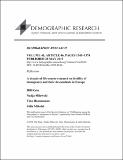A decade of life-course research on fertility of immigrants and their descendants in Europe
Abstract
Objective : This article provides an introduction to a special collection on childbearing among the descendants of immigrants in Europe. We first review recent life-course research on fertility of immigrants and their descendants followed by a summary of the papers of this special collection. Finally, we discuss their contribution and future research avenues. Results : The papers of this special collection report significant heterogeneity in childbearing patterns among descendants of immigrants. Some groups have fertility levels similar to those of natives, some have lower fertility, and some exhibit significantly higher fertility. Further, polarisation characterises many descendant groups; some individuals have small families or even remain childless, whereas others have large families. Conclusions : We conclude that factors related to mainstream society, minority subculture, and minority status all shape fertility behaviour of the descendants of immigrants and that their impact varies across descendant groups. Future research should investigate whether the observed heterogeneity in childbearing patterns is likely to decline over generations or the diversity is here to stay.
Citation
Kulu , H , Milewski , N , Hannemann , T & Mikolai , J 2019 , ' A decade of life-course research on fertility of immigrants and their descendants in Europe ' , Demographic Research , vol. S23 , no. 46 , pp. 1345-1374 . https://doi.org/10.4054/DemRes.2019.40.46
Publication
Demographic Research
Status
Peer reviewed
ISSN
1435-9871Type
Journal article
Description
The research leading to these results has received funding from the European Union’s Seventh Framework Programme (FP7/2007- 2013) under grant agreement no. 320116 for the research project FamiliesAndSocieties. Hill Kulu and Júlia Mikolai’s work was also supported by Economic and Social Research Council grant ES/K007394/1 and carried out in the ESRC Centre for Population Change (CPC).Collections
Items in the St Andrews Research Repository are protected by copyright, with all rights reserved, unless otherwise indicated.

